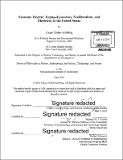Economy electric : techno-economics, neoliberalism, and electricity in the United States
Author(s)
Özden-Schilling, Canay
DownloadFull printable version (20.89Mb)
Other Contributors
Massachusetts Institute of Technology. Program in Science, Technology and Society.
Advisor
Michael M. J. Fischer.
Terms of use
Metadata
Show full item recordAbstract
This dissertation is a study of emergent economic forms of life. It investigates recent remakings of economic existence and modes of disseminating these forms of life, and does so with particular reference to the crafting of electricity markets in the United States. It draws on more than a year of fieldwork among experts and users involved in electricity exchange. The experts and users among whom I conducted participant observation include computer programmers who assist companies that trade in electricity markets by collecting information and making trading suggestions, electrical engineers who design new infrastructures such as electricity markets for buying and selling electricity in bulk, psychologists and social scientists who study people's electricity consumption behavior to generate economic technologies to save money to users and providers of electricity, and citizen groups based in West Virginia and rural Illinois that organize against electricity markets' exclusion of consumers from decision-making mechanisms. Bringing questions of economic anthropology to bear upon the emergent literature of the anthropology of infrastructures, I propose that new economic forms of existence often come to being though infrastructure building and maintenance. For the last 20 years, experts of diverse technical backgrounds have been reprogramming the electric grid to allow for enhanced calculative choice and competition - principles at the core of the neoliberal agenda. I demonstrate that people who do not necessarily concern themselves with the formal study of economics often take the lead in creating and propagating wide-ranging economic emergent forms of life, such as neoliberalism, across the social field. To zero in on their work, I develop the concept of "techno-economics": an approach that understands commodities, whether they are living nonhumans such as livestock or inorganic processes like electricity, as more than passive receptacles of human design, and locates humans within their efforts to commoditize and marketize unruly objects, like electricity - a commodity that cannot be stored in warehouses or shipped on highways. Anthropological studies of the techno-economic, I suggest, are best equipped to make connections in ethnographic representation between otherwise disparate nodes of social life, like expertise and wires, law and steel, and finally, economics and electricity.
Description
Thesis: Ph. D. in History and Social Study of Science and Technology (HASTS), Massachusetts Institute of Technology, Program in Science, Technology and Society, 2016. Cataloged from PDF version of thesis. Includes bibliographical references (pages 263-285).
Date issued
2016Department
Massachusetts Institute of Technology. Program in Science, Technology and SocietyPublisher
Massachusetts Institute of Technology
Keywords
Program in Science, Technology and Society.